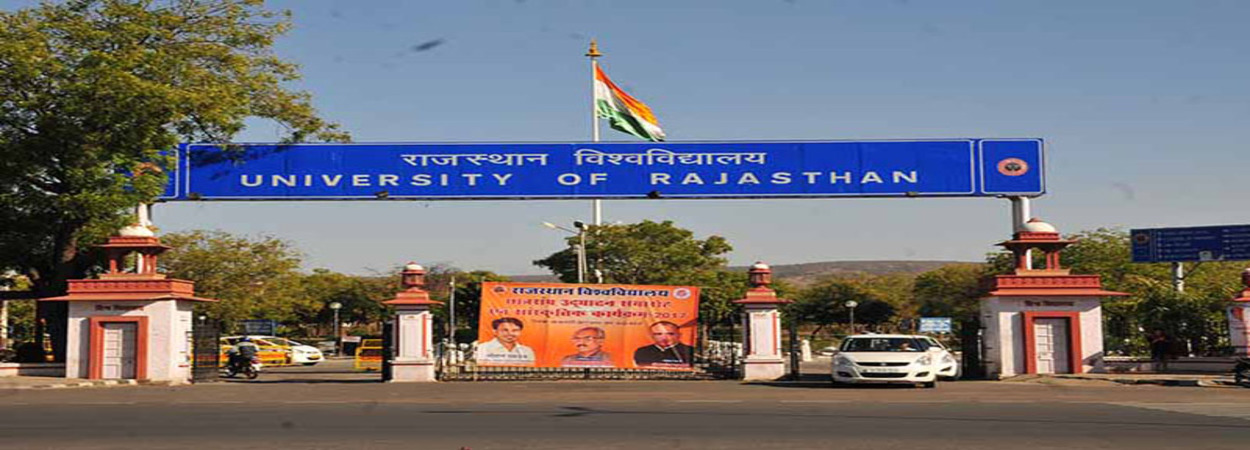Introduction about Ph.D. From Radha Govind University
Radha Govind University, located in the vibrant state of Jharkhand, has earned a reputation for academic excellence and innovative research. The Ph.D. program at Radha Govind University is designed to nurture scholarly talent and foster groundbreaking research across diverse disciplines. With a focus on both theoretical and practical aspects of research, the program encourages candidates to explore interdisciplinary approaches and develop original research that addresses contemporary challenges.
The university’s commitment to excellence is evident in its state-of-the-art research facilities, experienced faculty, and a curriculum that balances rigorous coursework with practical research experience. Students are provided with opportunities to engage in collaborative projects, attend international conferences, and publish their findings in reputed journals. This comprehensive approach ensures that every candidate not only gains deep subject knowledge but also develops critical thinking, problem-solving, and analytical skills essential for a successful career in academia, industry, or research institutions.
Emphasizing ethical research practices and a student-centric learning environment, Radha Govind University supports its doctoral candidates through personalized mentorship and continuous academic guidance. Whether your interest lies in the sciences, humanities, or interdisciplinary studies, this Ph.D. program is structured to help you build a robust foundation in research methodologies while encouraging innovative thought and creative exploration. As you embark on this academic journey, you will find a community that values intellectual curiosity and rewards scholarly dedication, preparing you to contribute significantly to your chosen field.
Fee Structure for Ph.D. in Radha Govind University
The fee structure for the Ph.D. program at Radha Govind University is designed to be transparent and affordable, providing students with quality education and excellent research support. Below is an overview of the typical fee components:
| Tution Fee Per Year | Registration | Total Fee |
|---|---|---|
| Rs. 65,000 | Rs. 12,000 | Rs. 77,000 |
Admission Process For Ph.D. in Radha Govind University
The admission process at Radha Govind University is comprehensive and rigorous, ensuring that candidates with a strong academic background and research potential are selected for the Ph.D. program. The process is designed to assess both your academic credentials and your capacity for independent research.
- Review the eligibility criteria and admission guidelines on the official university website.
- Complete the online application form with accurate personal, academic, and research details.
- Submit all required documents, including academic transcripts, research proposal, and identification proofs.
- Sit for a written entrance examination to evaluate your research aptitude and subject knowledge.
- Attend a personal interview with the selection panel to discuss your research interests and career goals.
- Receive the final admission decision based on the overall evaluation of your application and performance in the examination and interview.
Ensuring that you meet all deadlines and submit complete, verified documents is crucial for a smooth admission process.
Ph.D. Subjects in Radha Govind University
The Ph.D. program at Radha Govind University offers a wide array of subjects that cater to the diverse research interests of its students. The curriculum is designed to provide both depth and flexibility, enabling candidates to specialize in their chosen fields while gaining a broad understanding of related disciplines. Below is a sample table of core subjects available:
| Subject | Description |
|---|---|
| Advanced Research Methodology | Focuses on research design, data collection, analysis, and interpretation techniques. |
| Interdisciplinary Studies | Encourages collaboration across multiple disciplines to solve complex research problems. |
| Quantitative & Qualitative Analysis | Provides comprehensive training in both statistical methods and qualitative research frameworks. |
| Special Topics in [Your Discipline] | Offers tailored courses based on emerging trends and specific research interests. |
Document Required For Ph.D. in Radha Govind University
A complete set of documents is essential for the evaluation of your Ph.D. application at Radha Govind University. These documents help verify your academic achievements and research potential. The required documents include:
- Academic Transcripts and Degree Certificates from all previously attended institutions.
- A detailed Research Proposal outlining your intended area of study and research objectives.
- A comprehensive Curriculum Vitae (CV) highlighting your academic, professional, and research experiences.
- Proof of Identity such as Aadhaar card, Passport, or any other government-issued ID.
- Letters of Recommendation from professors or industry professionals familiar with your work.
- A Statement of Purpose (SOP) that articulates your research interests, career aspirations, and motivation for pursuing a Ph.D.
Ensure that all documents are current, duly verified, and submitted in the prescribed format to avoid any delays in the admission process.
Radha Govind University Ph.D. Syllabus
The Ph.D. syllabus at Radha Govind University is meticulously designed to offer a balanced blend of theoretical knowledge and practical research skills. The curriculum is divided into several phases, each focusing on different aspects of research and academic development. Below is a sample breakdown of the syllabus:
| Phase/Semester | Subject/Module | Credits/Weightage |
|---|---|---|
| Phase I | Core Research Methodology and Foundational Courses | 20 |
| Phase II | Advanced Theoretical Concepts and Elective Courses | 15 |
| Phase III | Interdisciplinary Research and Data Analysis | 25 |
| Phase IV | Thesis Writing, Defense, and Publication | 40 |
The syllabus is reviewed periodically to incorporate new research developments and technological advancements, ensuring that students receive a modern and comprehensive education.
Radha Govind University Research Methodology
The research methodology training is a core component of the Ph.D. program at Radha Govind University. It is designed to equip candidates with the essential tools and techniques for conducting rigorous, high-quality research. Key components of the training include:
- Formulation of a comprehensive research framework and proposal.
- Training in both qualitative and quantitative research methods.
- Workshops on advanced data analysis techniques and statistical tools.
- Emphasis on ethical research practices and data integrity.
- Regular mentoring sessions and peer review processes to refine research strategies.
Radha Govind University Highlights
Radha Govind University is celebrated for its academic excellence, innovative research environment, and holistic approach to education. The table below highlights some of the key aspects that make the university stand out:
| Aspect | Details |
|---|---|
| Established | A prominent institution with a commitment to research and academic excellence |
| Location | Jharkhand, India – A region known for its rich cultural heritage and emerging educational opportunities |
| Accreditation | Recognized by national education authorities for quality research and academic standards |
| Facilities | Modern laboratories, extensive digital libraries, and collaborative research centers |
| Faculty | Highly qualified academicians and research experts with diverse industry experience |
| Collaborations | Strong partnerships with leading national and international institutions |
| Student Support | Scholarships, career counseling, research funding, and mentorship programs |
How To Apply For Ph.D. in Radha Govind University
Applying for the Ph.D. program at Radha Govind University is a streamlined process designed to help you seamlessly transition into your doctoral studies. Follow these detailed steps to complete your application:
- Visit the official Radha Govind University website and navigate to the Ph.D. admissions section.
- Review the eligibility criteria and detailed admission guidelines carefully.
- Fill out the online application form with accurate personal, academic, and research details.
- Upload all required documents such as academic transcripts, research proposal, CV, and proof of identity.
- Pay the application fee as per the instructions provided on the portal.
- Submit your application before the deadline and retain a copy for future reference.
- Prepare for the entrance examination and personal interview conducted by the selection panel.
- Monitor your email and the application portal for updates regarding your admission status.
Courses After Ph.D. in Radha Govind University
Upon completing the Ph.D. program, graduates from Radha Govind University have various avenues to further specialize and advance their careers. The university offers a range of additional courses and professional development programs, including:
- Post-Doctoral Research Programs
- Advanced Certificate Courses in Emerging Technologies and Research Areas
- Executive Leadership and Academic Management Training
- Specialized Workshops and Seminars for Skill Enhancement
- Industry-Academia Collaborative Programs and International Exchange Opportunities
Radha Govind University Scholarship
Radha Govind University is dedicated to supporting its Ph.D. candidates through a robust scholarship program. These scholarships provide financial assistance to cover tuition fees, research expenses, and sometimes offer a living stipend, allowing students to focus entirely on their research pursuits. Awarded based on academic merit, research potential, and financial need, these scholarships are designed to encourage excellence and innovation in research. Detailed eligibility criteria, application procedures, and deadlines are available on the official university website. By providing comprehensive financial support, Radha Govind University ensures that its doctoral candidates have the necessary resources to excel in their research and make significant contributions to their fields.
- Merit-based awards for exceptional academic performance.
- Need-based financial aid to support tuition and research-related expenses.
- Research grants for conference participation, publication fees, and project funding.
- Opportunities for international collaboration and academic exchanges.
- Dedicated mentorship and career development support included in the scholarship package.
Radha Govind University FAQ's Regarding Ph.D.
Below are some frequently asked questions to provide clarity on the Ph.D. program at Radha Govind University:
- What are the eligibility criteria for the Ph.D. program?
Candidates must hold a relevant Master’s degree with a strong academic record and meet the minimum research experience requirements specified by the university.
- How do I apply for the Ph.D. program?
Applications are submitted online through the official Radha Govind University website by completing the application form and uploading the required documents.
- What does the fee structure include?
The fee structure includes the annual tuition fee, registration fee, and the total fee, as detailed in the fee structure table above.
- Are there any scholarships available for Ph.D. candidates?
Yes, the university offers scholarships based on academic merit and financial need. Detailed information can be found on the scholarship page.
- What subjects are included in the Ph.D. curriculum?
The curriculum includes core subjects such as Advanced Research Methodology, Interdisciplinary Studies, Quantitative & Qualitative Analysis, and specialized courses based on your research interests.
- Which documents are required for the application?
Applicants must submit academic transcripts, a detailed research proposal, a comprehensive CV, identity proofs, letters of recommendation, and a Statement of Purpose (SOP).
- What does the research methodology training involve?
The training covers both qualitative and quantitative methods, advanced data analysis techniques, research ethics, and the development of a robust research framework.
- How long does the Ph.D. program take to complete?
The program typically takes between three to five years, depending on the research area and individual progress.
- Is there support available for publishing research work?
Yes, students receive guidance from experienced faculty, access to research journals, and opportunities to present their work at national and international conferences.
- What career opportunities are available after completing the Ph.D.?
Graduates can pursue academic careers, post-doctoral research, industry roles, or advanced professional training programs.















